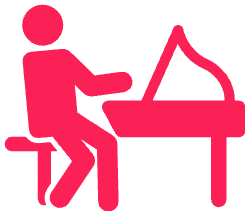Mastering the piano is a journey that involves developing a variety of skills. Whether you’re a beginner or looking to advance your abilities, having a clear roadmap can significantly enhance your learning experience.
Here’s a comprehensive piano skills checklist that will help you play like a pro, integrating essential techniques and knowledge areas. This guide will also touch upon piano skill levels, the progression of piano skills by age, and key skills every pianist should master.
Key Takeaways
| Skill | How to Achieve |
|---|---|
| Proper Posture and Hand Positioning | Sit with a straight back, elbows at key height, and curved fingers. |
| Reading Music Notation | Learn musical notation basics and practice sight-reading. |
| Scales and Arpeggios | Practice major and minor scales and arpeggios in all keys with a metronome. |
| Chord Progressions | Practice basic triads and common progressions in different keys. |
| Dynamic Control and Expression | Practice pieces with varying dynamics and focus on phrasing and articulation. |
| Sight-Reading | Dedicate time to sight-read new music regularly. |
| Aural Skills | Practice identifying intervals, chords, and rhythms by ear. |
| Improvisation and Composition | Start with simple melodies over chord progressions and gradually incorporate complex harmonies and rhythms. |
| Performance and Practice Techniques | Break pieces into sections, use slow practice for difficult passages, and simulate performance conditions. |
1. Proper Posture and Hand Positioning

- Importance: Good posture and correct hand positioning are fundamental for playing efficiently and preventing injury.
- How to Achieve: Sit at the piano with a straight back, elbows at a comfortable height, and fingers curved over the keys. This ensures that your movements are fluid and that you can reach the keys comfortably.
2. Reading Music Notation

- Importance: Understanding how to read sheet music is crucial for interpreting compositions and expanding your repertoire.
- How to Achieve: Learn the basics of musical notation, including the staff, clefs, notes, and rhythms. Practice sight-reading regularly to improve fluency.
3. Scales and Arpeggios

- Importance: Scales and arpeggios build finger strength, dexterity, and familiarity with key signatures.
- How to Achieve: Practice major and minor scales and arpeggios in all keys. Use a metronome to ensure consistent tempo and gradually increase speed as you become more comfortable.
4. Chord Progressions

- Importance: Understanding chord progressions helps in playing a wide variety of music and in improvisation.
- How to Achieve: Start with basic triads and progress to more complex chords. Practice common progressions like I-IV-V-I in different keys.
5. Dynamic Control and Expression

- Importance: Dynamics and expression are essential for conveying emotion and creating a captivating performance.
- How to Achieve: Practice playing pieces with varying dynamics, from pianissimo to fortissimo. Pay attention to phrasing, articulation, and the use of the pedal.
6. Sight-Reading

- Importance: Sight-reading allows you to play new pieces more quickly and with greater accuracy.
- How to Achieve: Dedicate time each practice session to sight-read new music. Focus on maintaining a steady tempo and correct rhythms.
7. Aural Skills

- Importance: Aural skills enable you to understand music better, play by ear, and improve musical memory.
- How to Achieve: Practice identifying intervals, chords, and rhythms by ear. Sing or hum melodies to reinforce your listening skills.
8. Improvisation and Composition

- Importance: Improvisation fosters creativity and a deeper understanding of musical structure.
- How to Achieve: Start by improvising simple melodies over familiar chord progressions. Gradually incorporate more complex harmonies and rhythms.
9. Performance and Practice Techniques

- Importance: Effective practice techniques and performance skills are key to mastering the piano and playing confidently in front of others.
- How to Achieve: Break down pieces into manageable sections, use slow practice to perfect difficult passages, and simulate performance conditions to build confidence.
Piano Skill Levels and Progression by Age
Levels of Piano Skill

- Beginner: Basic knowledge of notes, rhythms, simple scales, and easy pieces.
- Intermediate: Ability to play more complex pieces, intermediate scales and arpeggios, basic sight-reading, and aural skills.
- Advanced: Mastery of challenging repertoire, advanced technical skills, strong sight-reading ability, and proficient in improvisation and composition.
Piano Levels by Age

- Children (5-10 years): Focus on basic skills, fun pieces, and games to keep learning engaging.
- Teens (11-18 years): Intermediate skills, preparing for exams, and developing a personal style.
- Adults: Depending on prior experience, adults may be beginners or at an advanced level, focusing on personal goals and preferred genres.
Recap on piano skills checklist
By following this piano skills checklist, you can systematically improve your abilities and play like a pro. Remember, consistent practice and a passion for learning are the keys to success on your piano journey.
A word from the author
Reference
Latest posts by Ulrich Y. (see all)
- Yuja Wang Family – All There is To Know! - June 4, 2024
- Top 10 Adjustable Piano Chairs in 2024 - June 2, 2024
- The 10 Most Popular Types of Jazz Piano You Need to Check Out! - May 31, 2024





